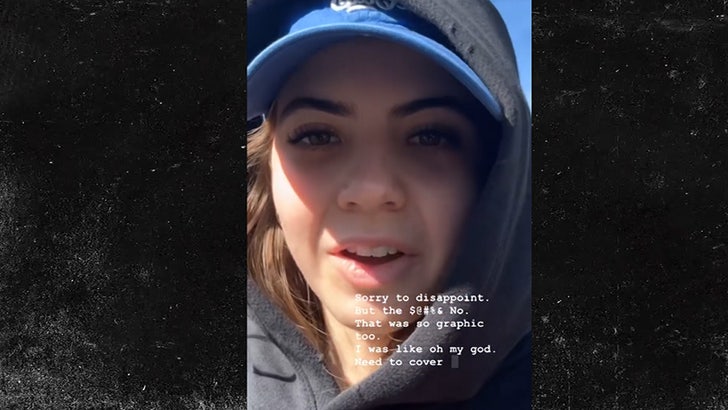Bobbi Althoff Deepfake: Unpacking The Viral 'Leaked Video' And AI's Dangers
In an era where digital content reigns supreme, the line between reality and fabrication is becoming increasingly blurred. This stark truth was recently brought into sharp focus by a distressing incident involving popular podcaster and interviewer, Bobbi Althoff. For days, the internet buzzed with mentions of a "Bobbi Althoff leaked video," causing widespread concern and confusion. However, as the dust settled, it became clear that this viral sensation was nothing more than a sophisticated, malicious deepfake, serving as a chilling reminder of the modern-day dangers posed by artificial intelligence.
The incident not only thrust Althoff into an unwanted spotlight but also highlighted the alarming vulnerabilities within our digital ecosystem, particularly on platforms like X (formerly Twitter), which have struggled to crack down on the rapid spread of AI-generated misinformation. This article delves into the details of the Bobbi Althoff deepfake scandal, her powerful response, and the broader implications of such AI-generated content for public figures and the digital landscape at large.
The Viral Sensation: What Was the 'Bobbi Althoff Leaked Video'?
On a Tuesday afternoon, a fake, sexually explicit video purporting to feature podcast host Bobbi Althoff began spreading rapidly across X. Titled "Bobbi Althoff leak video," the AI-generated content showed a woman with Althoff's face performing an explicit act. The video quickly went viral, racking up more than 4.5 million views on various platforms and sparking widespread reactions, with many users warning others not to engage with the content.
Anatomy of a Deepfake Hoax
The "Bobbi Althoff Leaked Video" refers to a fake AI-generated deepfake video showing a woman with interviewer Bobbi Althoff's face touching herself. What made this particular incident so alarming was the realism of the fake video. Unlike earlier, cruder attempts at deepfakes, this AI-generated video of Althoff was nearly indistinguishable from reality and extremely graphic in nature. Because of this realism, the fake video was portrayed as authentic, leading many to believe it was a genuine "leak."
The content spread like wildfire, not just on X, but also on niche message boards, Reddit, and other corners of the internet. The speed at which it proliferated underscores the challenges social media platforms face in moderating and removing such harmful content. Disturbingly, the maker of one fake Althoff video even offered on a deepfake forum to sell a 20-minute version of it for $10, payable via PayPal, according to listings reviewed by The Post, illustrating a disturbing trend of monetizing non-consensual deepfake content.
Bobbi Althoff's Swift Response: Setting the Record Straight
As the alleged deepfake images and videos of her went viral online, Bobbi Althoff quickly responded to her trending status. Taking to Instagram on Wednesday, the 26-year-old podcast host addressed the sexually explicit video, confirming unequivocally that it was not real. "Hate to disappoint you all," she wrote, "but the reason I'm trending is... The reason I’m trending is... The reason I’m trending is... not me, sorry to disappoint."
Disappointment and Clarification
Althoff, known for her "Really Good Podcast," shared a short clip to her Instagram stories, clarifying that the video leaks of her were AI-generated. She directly called out the NSFW video as fake, stating, "The deepfake video superimposes what appears to be the 26-year-old Internet star’s face onto another person’s body." Her clear and immediate denial was crucial in dispelling the rumors and setting the record straight for her millions of followers and the wider public.
Her response was a mix of disappointment and a firm denial, emphasizing that she was the latest celebrity to be targeted by deepfakes. This incident placed her among a growing list of public figures, including pop superstar Taylor Swift, who have recently fallen victim to non-consensual, AI-generated explicit content circulating online.
The Alarming Rise of AI Deepfakes: A Growing Threat
The Bobbi Althoff deepfake incident is not an isolated case but rather a stark example of a rapidly escalating problem. Just one month after deepfakes of Taylor Swift went viral on X, Bobbi Althoff was targeted by AI-generated videos, sparking widespread backlash online. This pattern underscores a chilling vulnerability within our digital ecosystem, where advanced AI tools are being misused to create incredibly convincing, yet entirely fabricated, content.
Beyond Bobbi Althoff: A Wider Problem
Deepfakes, particularly those of a sexually explicit nature, represent a significant threat to individuals' privacy, reputation, and consent. They can be used to defame, harass, and exploit, with devastating consequences for the victims. Internet researcher Genevieve Oh told NBC News that she had "tracked more than 40 posts on X containing the Althoff" deepfake, indicating the scale of the problem and the ease with which such content can proliferate.
The technology behind these deepfakes has become so sophisticated that distinguishing them from reality is increasingly difficult for the average viewer. This realism makes them incredibly potent tools for malicious actors, who can leverage them to spread misinformation, manipulate public perception, and cause immense personal distress. The Bobbi Althoff case, much like the earlier Taylor Swift deepfakes, serves as a wake-up call to the pervasive nature of this digital threat.
The Challenge for Social Media Platforms
The rapid spread of the fake Bobbi Althoff video on X highlighted the platform’s recent challenges in cracking down on deepfakes. Despite policies against non-consensual explicit content, the sheer volume and sophisticated nature of AI-generated media make effective moderation an uphill battle. Social media companies are under increasing pressure to develop more robust detection and removal mechanisms, as well as to implement stricter policies to prevent the proliferation of such harmful content.
The issue is not just about removing content after it goes viral but also about preventing its initial spread and holding those who create and disseminate it accountable. This requires a multi-faceted approach involving technological solutions, legal frameworks, and increased public awareness.
Understanding the Impact: Why This Matters
The Bobbi Althoff deepfake incident is more than just a celebrity scandal; it's a critical moment that highlights the profound implications of AI's advancements. It underscores how easily an individual's image and identity can be hijacked and manipulated for malicious purposes, leading to reputational damage and emotional distress. For Bobbi Althoff, a renowned social media influencer and content creator, finding herself at the center of such an unwanted spotlight due to the unauthorized release of personal (albeit fake) content is deeply concerning.
Digital Vulnerability and Consent
The incident brings to the forefront the chilling vulnerabilities within our digital ecosystem. In a world where AI can create images and videos that are "nearly indistinguishable from reality," the concept of digital consent becomes paramount. Non-consensual AI-generated content, especially of an explicit nature, is a severe violation of an individual's rights and privacy. It is a form of digital assault that can have lasting psychological impacts on victims.
Moreover, the ease with which such content can be created and distributed creates a dangerous precedent. It raises questions about the future of online identity, trust in digital media, and the responsibility of technology developers and platform providers. The public's reaction, with many warning others not to check the "hidden" or "leaked" content, shows a growing awareness but also the inherent curiosity that drives such virality.
The Bobbi Althoff deepfake video, much like the earlier Taylor Swift deepfake, serves as a stark reminder that as AI technology advances, so too must our vigilance and our ethical frameworks. It is a call to action for stronger regulations, more effective platform moderation, and greater public education on media literacy. We must all learn to critically evaluate the content we encounter online and understand that not everything we see is real.
Summary
The "Bobbi Althoff leaked video" that went viral across social media platforms was definitively a fake, AI-generated deepfake. Podcaster Bobbi Althoff herself swiftly addressed the explicit content on Instagram, clarifying that the video was not real and that she was merely the latest celebrity victim of non-consensual AI-generated content. This incident highlighted the alarming realism of modern deepfakes and the significant challenges faced by platforms like X in combating their rapid spread. It underscored the urgent need for greater digital literacy, robust platform moderation, and stronger ethical considerations as AI technology continues to advance, emphasizing the severe implications for individual privacy, consent, and the integrity of online information.
What Is The Leaked Bobbi Althoff Video Going Viral On Social Media? The

Bobbi Althoff's Leaked AI Deepfake Video Was Likely Made This Way

Bobbi Althoff Reacts to 'Leaked' NSFW Video, Speaks Out After Going